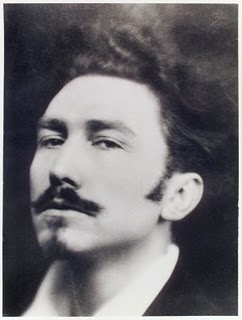Ezra Pound, 'Cantico del Sole'
LISTEN TO THE SHOW
 Ezra Pound integrates — or, rather, doesn’t quite integrate — a response to a stupid contemporary judicial ruling on censorship and a fragment from the Canticle of Simeon (Luke, 2:29-32) to make a powerful, comic (even schticky) satire on American culture of his time and perhaps of ours. How this works, variously (and depending too on which recording of Pound reading the poem you hear), is the topic of our twelfth PoemTalk. Talkers this time: Charles Bernstein, Joshua Schuster, Rachel Levitsky.
Ezra Pound integrates — or, rather, doesn’t quite integrate — a response to a stupid contemporary judicial ruling on censorship and a fragment from the Canticle of Simeon (Luke, 2:29-32) to make a powerful, comic (even schticky) satire on American culture of his time and perhaps of ours. How this works, variously (and depending too on which recording of Pound reading the poem you hear), is the topic of our twelfth PoemTalk. Talkers this time: Charles Bernstein, Joshua Schuster, Rachel Levitsky.
How broad is the satire? Is the figure whose sleep is troubled by Americans reading classics widely the anxious, sensorious judge, relieved that no one really reads the indecent classics? Or is he the modernist poet, aiming for whatever would strike such a man as indecent? (Is this just another early-Pound personae? Is it the performance of a subject position Pound would never quite occupy? Does the speaker's elitist animosity toward America confirm the judge’s disquietude?
PennSound’s Pound collection (it’s complete — everything recorded by Pound that we know of) includes several readings of “Cantico del Sole.” PoemTalk plays two of them, one from the 1930s, the other from the late 50s.
The thought of what America would be like
If the Classics had a wide circulation
Troubles my sleep,
The thought of what America,
The thought of what America,
The thought of what America would be like
If the Classics had a wide circulation
Troubles my sleep.
Nunc dimittis, now lettest thou thy servant,
Now lettest thou thy servant
Depart in peace.
The thought of what America,
The thought of what America,
The thought of what America would be like
If the Classics had a wide circulation...
Oh well!
It troubles my sleep.
PoemTalk’s director, engineer and editor is Steve McLaughlin, who, by the way, has recently taken a turn at selecting his 12 favorite PennSound recordings.
This episode of PoemTalk was recorded in the Arts Café of the Kelly Writers House in Philadelphia. Next time, PoemTalk goes on the road - to our Broadway studios in New York, for a discussion of a late poem by Wallace Stevens and the talkers are Nada Gordon, Lawrence Joseph, and Charles Bernstein. Stay tuned.
November 13, 2008
On Rachel Levitsky's 'Neighbor': scale / urban systems / representation
Rachel Levitsky’s 2009 poetry collection, Neighbor, takes up the relationship between neighbors as it occurs between people in an apartment building who share walls and floors, but also as it affords other intimacies. Levitsky’s figure of the neighbor contains the idea of the neighbor (a person who lives near you, and whose proximity can produce a mutual, if fragmentary, knowledge of one another’s quotidian lives) alongside neighborliness at a range of competing and simultaneous scales.
Rachel Levitsky’s 2009 poetry collection, Neighbor, takes up the relationship between neighbors as it occurs between people in an apartment building who share walls and floors, but also as it affords other intimacies. Levitsky’s figure of the neighbor contains the idea of the neighbor (a person who lives near you, and whose proximity can produce a mutual, if fragmentary, knowledge of one another’s quotidian lives) alongside neighborliness at a range of competing and simultaneous scales. In one poem called “Neighbor,” Levitsky writes,